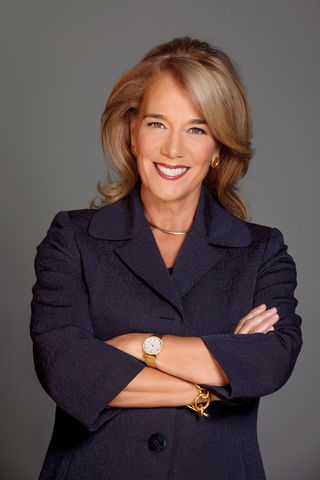Leadership
Leaders, Ask Yourself: "How Can We Touch Their Hearts?"
Lead Positive Profile with career transition support pioneer Laura Herring
Posted February 29, 2016

Laura Herring is Founder and Chair Emeritus of IMPACT Group, a global career development firm that is the leader in the Relocation Family Transition space. Her latest book is about how to stare failure in the face and say, “No fear allowed!” A two-time breast cancer survivor, Laura is donating 100% of her profits from her book, aptly titled, No Fear Allowed: A Story of Guts, Perseverance, and Making an Impact, and speaking engagements to breast cancer research. Her goal is to sell 1 million books for the cure!
Laura is both a colleague and a friend. In No Fear Allowed, she chronicles her heroic journey as an entrepreneur. After our interview for this profile, she told me, “I wish you had interviewed me before the book. Now I fully understand the path I was on as I moved through my career.” This is a great example of how you too can use the Heroic Leadership Journey framework in retrospect to examine your path, your achievements, and the relationships you have built along the way.
As you read part 1 of Laura’s story, I invite you to take a walk down memory lane and think about your own Heroic Leadership Journey.
Tune in next week for part 2!
THE CALL
The first phase of the Heroic Leadership Journey is The Call. This is when the leader realizes an imperative for change, a change connected to deeply held values and beliefs and personal aspirations. The Call often becomes a mighty cause, the promise of positive change in the world that you seek.
When did you begin to see the need for positive change and how was that change connected to your values?
Well, as a child of the '60s, by the time I was 18 I really knew my passion in life was to make a positive difference in the lives I touched. I also went to Webster University and Sister Jacqueline Grennan, the President of Webster, would speak to us with such passion about helping others, making a difference. She was such a profound role model that I said to myself, "That's who I want to be and how I want to think and what I want to do."
I wasn't certain exactly what that journey would be but I really felt compelled to reach out and help make a difference with whomever I interfaced. That led to several wonderful steps across my journey, and one of them was becoming a high school counselor. I spent hours with kids counseling them but the high school I was with didn't want me to spend so much time counseling the kids! They wanted me to do their numbers, count up their courses, find out how many math credits they had. I just didn't feel that that was making a difference in their lives.
What that experience said to me was that I had to go into private practice as a psychologist. So I got my psychology degree, went into private practice, and for 13 years, every day, I made a difference in people's lives. That was a real blessing for me. I really, really loved being in private practice.
I kept hearing in my private practice the pain that relocating families had. Relocating families had to not only say goodbye to family and friends, grandma and grandpa, but many—over sixty percent of the spouses—had to say goodbye to their jobs, many of which they had had for years and were extremely successful at. The pain of relocating was significantly impacting the quality of life and the emotional health of those families.
I started doing research on the impact of relocation on families. I held many focus groups for relocating spouses, and over and over again, they said the most difficult part of being a corporate spouse was relocation. One hundred percent of the answers to the question, "What is the most difficult part of being a corporate spouse?" was relocation. And that got me to begin thinking, "How can I make a difference with them?"
So I started the IMPACT Group, and I chose that name because I truly wanted to make an impact on people's lives. I brought my idea to the corporation who had hired me to help spouses in their organization, McDonnell Douglas, and I presented my idea. They said, "This is a terrific idea. Let's do something."
With approval from a Fortune 25 company, I knew I had something. I had not only hit a nerve, I had created a solution, and now, we are 27 years old. We are in 33 countries and working with over 200 Fortune 500 companies, not only in relocation but outplacement and talent management.
I moved for the first time as part of a corporate family in 1952—from New Jersey to St. Louis, and then again in 1962, from St. Louis to Memphis. I have to say, when I heard their stories, it really rubber bands me to my own experience growing up of how painful leaving family and friends was.
You really had the expectation that if you wanted to climb the organizational ladder, especially as a leader, you were going to have to move.
Yes and to be honest, Kathy, it still is the same, and that's why we have a company. I met with the chairwoman of Johnson & Johnson just last week in DC, and I related to her that we have been with her company now for 27 years, and many of her families have moved 13 times with us.
I believe that leaders who are responding to a great imperative need actually wind up developing and growing themselves in the process. Can you talk about what you learned and how you saw yourself develop as you founded the IMPACT Group?
Kathy, that's a great, great question to ponder. I have thought about it over the past couple of months, particularly as I was writing the book over the past seven years. I had just assumed that everyone felt like I did, passionate about their work. I assumed that if people heard about my calling, that if they loved their families, they would embrace the calling as well.
But what I had to learn was how to interview people and find people who not just had the calling, but had the passion for working hard, for giving 180 percent of their mind and soul to helping us achieve our goal.
I had to develop a lot of patience because I just assumed if I taught someone something that they would just make it their goal to do it well and thorough. I had to grow in leadership development. I had to get my teams to want to follow me up those hills that sometimes were very, very steep.
What I learned is to not tell them what to do but work side by side with them, carry the banner with them, and have fun with them. I had to become a storyteller. I had to share with them what my experience was when I went on a call to Johnson & Johnson.
I would say things like, "Well, Mr. Grant and I went to lunch and then I started telling him how wonderful you all were and I started telling him stories of some of the families we have been helping. And, Mary, I told him your story about Mr. and Mrs. Jones. Jim, I told him how you researched all the schools for their child with special needs." I went around the room and singled different people out all the time because I realized they needed to feel special.
They needed to feel like they were making a difference—not just that our services were making a difference, but that individually they were making a difference.
Just recently, we held the book launch at the office at IMPACT Group, even though I've been retired eight years. Everyone wanted to be a part of it. They got their Amazon cards out. They bought the book. We had champagne. We had donuts. We had fruit. We just made it fun. I had shirts printed up saying, "IMPACT Group Launch Team," "No Fear Allowed Launch Team." So we celebrated the end result of all those years.
The brilliant thing that you're talking about, the blinding flash of the obvious that's so brilliant, is that nobody can do anything alone, right? It could be your calling but unless you have an inspired team moving with you and feeling The Call—we always say to the leaders who we coach, "People follow people, not just great ideas."
So you made yourself a human magnet, and who wouldn't want to bask in the recognition and the limelight of their boss?
THE RESISTANCE
I love the idea about learning patience. Leaders go first, right? They're out there first. They're out ahead of most people and it is hard to encourage people to catch up.
The second phase of the journey is called The Resistance and the Meeting of the Mentors. What you've just talked a little bit about is resistance in the form of other people not really getting, "Wow, this is a mighty cause." And so you need to, kind of, bring them along. Did you ever have any self-doubt when you were starting out?
I never had any self-doubt about the vision but I remember thinking, "Some of these corporate people just don't get that they have a problem with their families." And so my first question when I met with them would be, "Have you ever relocated?" And if they said, "No," then I thought, "Aha. I have to find a way to touch their soul, touch their heart, tell them a heart story so that they get it."
They would say things like, "We don't have any problems. None of the spouses ever call us." And, of course, I'm trying to be rational, and I say, "Of course they wouldn't call you. Because they're the wife or they're the husband, and they're not wanting to make trouble for their executive spouse."
So I asked, "How can I touch their hearts?"
I created what is called a VK experience, a Visual Kinesthetic experience. They would see a picture, get a feeling, and then be in the state of receptivity. My psychology training helped me to realize the picture I needed to paint. I took pictures of a family making their 22nd move from Muscatine, Iowa, to Tampa, Florida, and I had 25 slides showing what would be considered some chaos.
But also, I focused on the spouse and the children. I followed them around when they said goodbye to their neighbors, when the little children said goodbye to their friends, their playmates, when the teenagers said goodbye to their basketball team, when the spouse sat crying with her neighbor. The last picture was the little five-year old girl packing her teddy bear and then looking out the window of the van, waving with tears running down her face.
Kathy, there wasn't a dry eye as I told the story of the heartbreak of this family picking up, packing up, and going again. The mother eventually became a registered nurse. It took her 16 years to complete her degree because the universities would not accept all the credits from city to city.
I started talking at conferences and putting on that presentation to 100 or 200 people, and they collectively created this volume of emotion and said, "Oh, my God, I had no idea. I had no idea." And I didn't realize it then, but the there is tremendous power in being in such a large group that feels the same way you do. So now I know what drinking the Kool-Aid really meant. These women and men finally got it.
THE THRESHOLD CROSSING
That sounds like phase three, the Threshold Crossing, where there's no turning back. When you know this is going to be your life's work.
Absolutely. Kathy, I couldn't have said it better.
It's so interesting that you haven’t talked about the negative impact on productivity or any business metric. You really go after the human being variable and that was enough to help decision-makers say, "Yes. It's important for us to do that."
Kathy, I couldn't quantify it, because guess what? Nobody wanted to speak up and say, "Oh, yes. I couldn't really work for six weeks because my wife wasn't happy." That just doesn't happen in corporate America. So trying to quantify it according to business metrics was never going to happen.
We did get some statistics, though. One slide stated, "It has been shown that an employee takes six weeks to adjust, and during that time may miss as many as four days in helping getting his family adjusted." That is the only data we had.
We quantified that as best we could saying that you're losing about $25,000 for every employee that you have. It costs $100,000 to relocate every employee. So now we have $125,000. We multiply that times 1,000 people. So it's costing you this much to relocate but you're losing this much in productivity. But the numbers never sold as well as touching their hearts.
I think that's such a great lesson for anybody who is leading an effort to move humanity forward in terms of things that might not be directly measurable.
Certainly, people could see the validity of your services and, you know, most corporations are very employee oriented. They have to be. People can vote with their feet. Companies need to do things to retain the best, the brightest, the most loyal, the most determined, and I think you did a great job of showing them exactly what not to do.
And when competition for talent started becoming a phrase, we hooked onto that. Spouses will support a spouse's company if they support the family and the spouse.
I really believe in my heart of hearts people are only trying to survive. You know, someone working for IBM isn't saying, "IBM is my mighty cause." Their families are their mighty cause, and I felt like we were having an impact on those families allowing them to live out their mighty cause of helping their families.
You and I know each other not only as colleagues but as friends, and I can see better than ever before how your dedication to your family and extended family plays out. You are the authentic embodiment of somebody who believes family comes first.
Yeah, I really do believe that. In fact, I'm trying to get a group of C200* women here to speak to Webster University, and one woman said, "Well, it's my sixth grandchild's sixth birthday and I can come if you really need me." I called her up and I said, "Don't you dare come. We will get by. If we have one less person, so be it. That six-year old will always remember Grandma wasn't there." She wrote back and she said, "Oh, my God, you're so right. She told me she wouldn't invite me to her wedding!”
*C200 is the premier female CEO organization in the world that lifts women up and supports women and tries to help them give back to their community.
******************
Laura Herring is a pioneer in career/life transition support, psychologist. She is on the Board of Trustees for Webster University, the Foundation for the Committee of 200, the Board of 200 and Chair Emeritus of IMPACT Group Advisory Board. People who meet Laura know she is fearless: She will do anything to help others become all that they can be! Follow Laura on Twitter @lauranofear.
Dr. Kathy Cramer has written seven best-selling books including Change The Way You See Everything, which started the ABT Global Movement. Her latest book, Lead Positive shows leaders how to increase their effectiveness through her revolutionary yet refreshing simple mindset management process, Asset-Based Thinking. Download her Speaker Kit here.
To read more of Kathy’s thought leadership, visit drkathycramer.com/watch-listen-read. Follow Kathy on Twitter at @drkathycramer.




